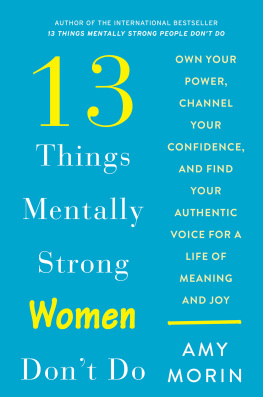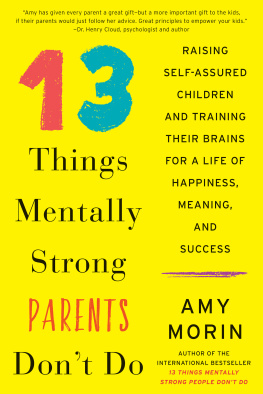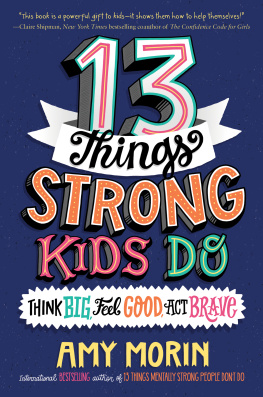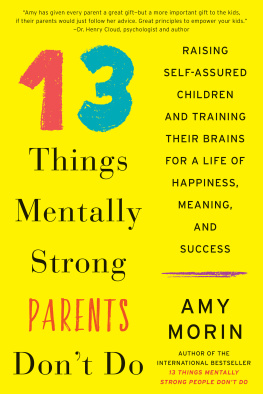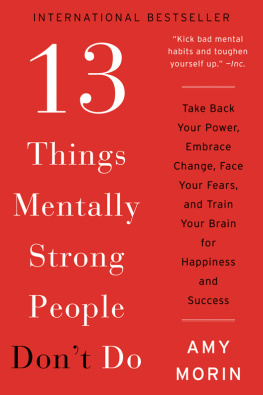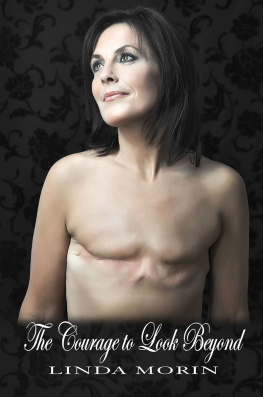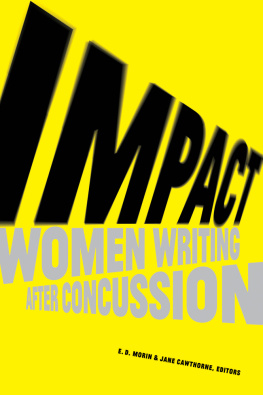Contents
To all the women who strive to become a little stronger today than they were yesterday
I grew up driving an ATV and catching night crawlers to use as fishing bait. I never liked dolls. I wasnt interested in makeup. And I hated to shop.
But my skinned knees, messy hair, and dirty fingernails made for a wonderful childhood. My parents convinced me I could do whatever boys didand I certainly tried. Whether it was racing the boys at recess or arm wrestling them into submission, I was able to keep up most of the time. But I wasnt trying to prove anything. I was just having fun.
The first time I recall encountering the word sexist was when I was in the seventh grade. My algebra teacher always asked a sports-related bonus question that had nothing to do with math. But if you got the answer correct, he added five points to your test grade. It was frustrating that five points hinged on knowing who ran the most yards in Sundays football game or who scored the most points in last years NBA playoffs. But no one complained.
One day, I was sick and had to stay home from school. I missed an algebra test, so I had to stay after school the following day to make it up. The bonus question was about a Major League Baseball player. Fortunately, I loved baseball, and I knew the answer. My teacher handed the graded test back to me the next day at the beginning of class. Written across the top of the page in red ink were the words 0 bonus points. You only got this right because one of your friends told you the question ahead of time.
I was horrified that my teacher thought I cheated, but I didnt say anything to him. I didnt know what to say. So I brought the test home and showed my dad.
My dad promptly wrote a note back to my teacher: Amy owns more than 10,000 baseball cards and she watches baseball games on TV with me every week. But because she got your bonus answer correct, you accused her of cheating. She knew the answer fair and square. But whats not fair is that you ask sports-related questions that have nothing to do with math. Clearly, you are trying to give the boys an advantage since most 13-year-old girls arent following professional sports that closely.
I gave the note to my teacher the next day and quickly took my seat. When he was done reading it, he announced to the class, I cant give you bonus questions anymore because someones father thinks Im sexist. That was the last time my teacher ever gave us a bonus question, and that was the first time I really thought about sexism.
It occurred to me that he didnt assume my friends told me any of the math questions ahead of timejust the sports question. And he assumed I couldnt possibly know the answer to an obscure baseball question unless I cheated. I cant help but wonder if he would have made that same assumption if I was a boy.
That happened twenty-five years ago, and Id like to think teachers arent still giving boys an unfair advantage in the classroom. But research shows its still happening, and well talk more about those specifics later on.
Id also like to think students and parents wouldnt be so tolerant of something like that these days. Back then, no one said anythingand neither did their parents. We tolerated it. Had my teacher not accused me of cheating, I dont know if my father would have raised the issue.
My ideas about sexism have certainly shifted since the seventh grade, and thankfully so have our cultures. Still, women continue to face unique challenges in todays world. Ive seen it in my therapy office as well as in my own life.
My Interest in Mental Strength Is Personal
When I landed my first job as a therapist, I was excited to help people overcome the challenges they faced. I was armed with a masters degree and knowledge Id gleaned from my textbooks, college lectures, and internships. During my first year as a therapist, however, my mother passed away suddenly and unexpectedly. My quest to learn about mental strength became personal.
I started studying everyone who came into my therapy office on a deeper level. I realized that some people were more likely to get better than others. They bounced back faster, they were hopeful about the future, and no matter what problems they faced, they persisted. I wanted to know what specifically made these people tick.
Then, in a cruel twist of fate, on the three-year anniversary of my mothers death, my twenty-six-year-old husband, Lincoln, died of a heart attack. Being a twenty-six-year-old widow was a surreal experience. The grief was overwhelming at times, but I knew that allowing myself to experience painful emotions was part of the healing process.
By then, I was armed with new knowledge about mental strength. I had discovered that people who persevered in life didnt just have healthy habitsthey were also intentional about avoiding the unhealthy habits that would keep them stuck.
I was starting to see clear patterns in the people I worked with. Those who were intent on reaching their greatest potential refused to indulge in counterproductive bad habits. The key to their progress wasnt just what they did. It was more what they didnt do.
I applied what Id learned to my own life as I worked through my grief. It took several years for my heart to heal. I was fortunate enough to find love again, when I met Steve. But shortly after we got married, Steves dad was diagnosed with terminal cancer. I found myself thinking things like This isnt fair. Why do I have to keep losing my loved ones?
But I knew that allowing myself to indulge in self-pity was one of those bad habits that would drain my mental strength at a time when I needed it the most. So I wrote a letter to myself reminding me of all of those bad habits that could keep me stuck in a place of misery. When I was done, I had a list of thirteen things mentally strong people dont do. I read over the list many times in the following days, and the reminders of what not to do gave me some solace. I decided if I found that list helpful, maybe others would too. So I published it online, hoping my message on mental strength might resonate with someone else.
Within a matter of days, the article went viral. It was read by more than fifty million people. Before I knew it, media outlets like Forbes and CNN were asking me about my list. My article didnt explain the context of the list, however, so everyone assumed Id written it because Id mastered everything on it. But the truth was, I still needed a reminder to avoid those thirteen things.
I was grateful to have the chance to write the book 13 Things Mentally Strong People Dont Do, to explain the story behind the viral article. And when readers kept asking me how to teach kids to be mentally strong, I was thrilled to be able to write 13 Things Mentally Strong Parents Dont Do.
Since I began talking about mental strength, Ive fielded many questions from women, especially in light of the #MeToo revelations. And while the principles of mental strength are the same for everyone, women experience different cultural pressures than men. Consequently, there are some specific bad habits that were more likely to engage in, struggle with, and experience, compared to our male counterparts.
The 3 Components of Mental Strength
Mental strength is a lot like physical strength. When it comes to growing stronger and becoming better, good habits are important. But your good habits will only get you so far in life if youre performing bad habits right alongside them.
If I wanted to grow physically strong, I might lift weights. But if I really wanted to see some muscle definition, Id need to give up eating too much junk food. Otherwise, my workouts wouldnt be all that effective. The same can be said for your mental muscles. You need good habits, like gratitude, to grow stronger. But if you really want to see results, you also have to give up bad habits, like comparing yourself with other people.

